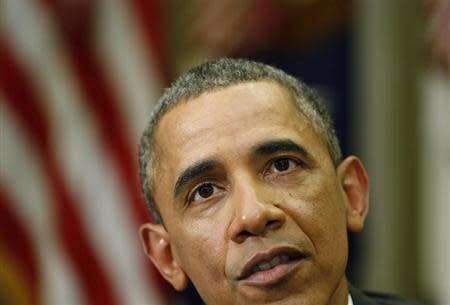Obama imposes sanctions on 11 Russians, Ukrainians over Crimea

By Steve Holland, Matt Spetalnick and Susan Heavey WASHINGTON (Reuters) - U.S. President Barack Obama on Monday imposed sanctions on 11 Russian and Ukrainian officials blamed for Russia's military incursion into Crimea, including two top aides to Russian President Vladimir Putin. The sanctions were the most visible sign of U.S. anger at Russia's attempt to absorb the Crimea region of southern Ukraine, reflecting the deepest plunge in U.S.-Russian relations since the Cold War. The U.S. sanctions came in an executive order signed by Obama a day after a Crimea referendum on Sunday aimed at allowing Russia to annex the autonomous region, a vote that the United States says was illegal and would never be recognized by Washington. During a White House press briefing, Obama warned that continued Russian military intervention in Ukraine would only increase Russia's isolation and exact a greater toll on its economy. "If Russia continues to interfere in Ukraine, we stand ready to impose further sanctions," he said. Amid fears that Russia might move into eastern Ukraine, Obama said further provocations will achieve nothing except to "further isolate Russia and diminish its place in the world." Obama's order freezes any assets in the United States and bans travel into the country of seven ranking Russian government officials and four individuals identified as Crimea-based separatist leaders. Ousted Ukrainian President Viktor Yanukovich was among those sanctioned. He fled Kiev after bloody protests against his rule. The United States also reached into Putin's inner circle by naming presidential aide Vladislav Surkov and adviser Sergei Glazyev. Russia's deputy prime minister, Dmitri Rogozin, and two state Duma deputies, Leonid Slutsky and Yelena Mizulina also were targeted. Senior administration officials who briefed reporters on the penalties said they were the most comprehensive sanctions applied to Russia since the end of the Cold War. A senior official said Obama's order clears the way for sanctions on people associated with the Russian arms industry and targets "the personal wealth of cronies" of the Russian leadership. Putin himself was not sanctioned. A senior Obama administration official said it would have been a highly unusual step and extraordinary to target a head of state. The administration announced plans for sanctions this month but had not named the individuals until Monday. Obama said he would travel to Europe next week and that Vice President Joe Biden was headed on Monday to Poland and Lithuania to reassure U.S. allies in the region. "Our message will be clear, as NATO allies we have a solemn commitment to our collective defense and we will uphold this commitment," he said. Officials warned more sanctions would follow if Russia proceeds with the formal annexation of Crimea, which officials said they believe Putin may announce in a speech on Tuesday. The White House said the United States would apply the extra sanctions "in a direct and targeted fashion as events warrant." The European Union also will impose travel bans and asset freezes on 21 Russian and Ukrainian officials, it was announced Monday. "Today's actions send a strong message to the Russian government that there are consequences for their actions that violate the sovereignty and territorial integrity of Ukraine, including their actions supporting the illegal referendum for Crimean separation," the White House said. A senior Obama administration official said there was "concrete evidence" that some ballots in the Crimea referendum arrived in some Crimean cities pre-marked. Officials said they did not fear retaliatory measures from Russia, saying they believed that country had more to lose politically and economically from isolation than the United States. They doubted Russia would cut off cooperation in trying to resolve disputes with Iran and Syria. (Reporting By Steve Holland, Matt Spetalnick and Susan Heavey; Editing by Bill Trott and Amanda Kwan)

